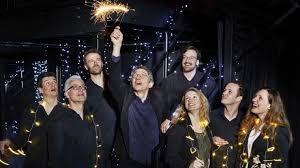I Fagiolini, Glyndebourne, Sunday 7 May 2017

Robert Hollingworth made some very interesting comments before the performance commenced. While these vespers are not as well-known as the regularly performed Vespers of 1610 they are, nevertheless, a complete liturgical recreation of Vespers of the period. As such he pointed out that we were involved in an act of worship just as much as if we were in a church or cathedral, and requested that we did not applaud until the end of each half.
His remarks raise a number of fascinating theological points which lay outside the remit of this review but reflect on the continuing, and wide scale, interest in religious music at a time when the believe systems which they support have been widely rejected. Few churches mounting these vespers liturgically would get anything like the response we saw at Glyndebourne yesterday. But then of course few churches can provide the sort of frisson which we got from I Fagiolini and the English Cornett & Sackbut Ensemble.
The Vespers are built around five psalm settings, a hymn, the Magnificat and the final Salve Regina. The Antiphons before each psalm were chanted but their liturgically necessary repeats were replaced – as was conventional in the seventeenth century – by instrumental versions of the text. Consequently, while the majority of the vocal items were by Monteverdi, we heard a Canzon by Viadana, a Sonata for solo violin by Uccellini – which brought the only spontaneous applause of the evening – a Toccata by Frescobaldi and a final sonata by Usper for cornetts and organ. All immaculately played and highly sensuous. In fact it was this tactile quality which seemed to inform the whole event. There was a latent eroticism to many moments of Monteverdi’s settings and a richness to Gabrielli’s Magnificat of 1615 which seemed to surpass any simply liturgical need.
The final Salve Regina was spine-tingling in its impact. A solo tenor and lute, crystal clarity of text and line, melting into silence.
I Fagiolini will be performing the other vespers across the rest of the year – details on www.ifagiolini.com

